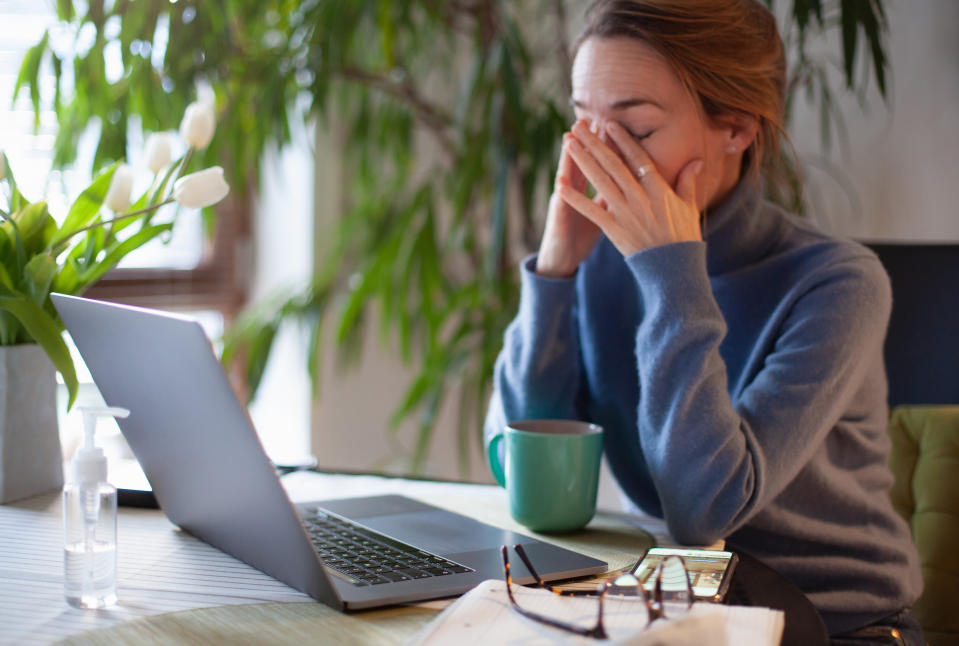Coronavirus: Why it's easy to burnout during lockdown

Working from home is not easy, despite the well-touted benefits. Life under lockdown means connecting with colleagues and bosses virtually, which can be a pain. With schools shut, workers are trying to get things done while keeping an eye on children. And at the end of the day, it is hard to leave work at work when your office is your home.
We might be avoiding the daily commute, but we are unintentionally spending more time at our desks. At the moment, working from home amid the coronavirus outbreak means the average Brit is putting in an extra 28 hours of overtime a month, according to a survey of 2,000 people by LinkedIn and the Mental Health Foundation. More than half of those surveyed (56%) said that they felt “more anxious and stressed” about work than they did before the pandemic.
Putting in extra hours can leave us at risk of stress, anxiety and burnout. Each person experiences burnout differently, signs of this state of chronic stress can include emotional, cognitive, and physical exhaustion; racing thoughts and constant worrying; feeling irritable or overwhelmed; and finding it difficult to concentrate or make decisions. It also can impact our physical health, as well as leading to mistakes at work.
READ MORE: Can you be forced to return to work? Your rights as a furloughed worker
Remote working is supposed to improve our work-life balance, allowing us more time to wind down and spend time doing things we enjoy. So why are so many of us struggling to stop working?
The pandemic has hit the UK economic hard, with thousands of people being made redundant or furloughed. In the UK, one in 20 people have lost a job because of coronavirus, according to a YouGov poll, while almost one in 10 have seen their hours reduced. It’s no surprise that those still working are afraid of losing their jobs – and are putting overtime to prove to their worth to their employers.
Remote working is encouraging a culture of so-called e-presenteeism, where workers feel they should be available 24/7 – even when they are unwell. According to the LinkedIn research, almost half of those surveyed (47%) admitted to pretending to be busy while working from home, over fears they could lose their job if not.
Of those surveyed, a quarter said they felt under pressure to respond to requests more quickly than normal – and “stay online” and contactable beyond the end of the working day. As a result, 12% said they log on before 7am and 18% of people said they are still working 12 hours later.
It’s perhaps unsurprising that so many of us are struggling with high levels of stress. We’re worried about our health, our friends and family members and the future, which may well lower the capacity we have for work. Our routines have completely changed, with many working parents now at home with children all day too. We’re also separated from our support networks, too. The LinkedIn research found almost a third of workers polled said they were experiencing increased anxiety, with a similar number (31%) reporting disturbed sleep.
READ MORE: How to avoid cabin fever when working from home
“Burnout, which is caused by chronic workplace stress, is a modern phenomenon that poses a huge risk to our physical and mental health,” said Chris O’Sullivan from the Mental Health Foundation.
“People working from home during these unprecedented times are at a greater risk of burnout due to the high stakes environment we find ourselves in both globally and personally. We cannot have the same business-as-usual expectations on ourselves or of our employees – there simply aren’t enough hours in the day to work full time, look after children at home and keep up our other responsibilities.”
It goes without saying that we are living in stressful times. But failing to manage this stress increases our risk of burnout, which can have long-term negative consequences on our mental wellbeing, physical health and careers.
Learning to say no when you’ve got too much going on is key. You should also make sure you stop working when you are supposed to, unless there is an emergency that absolutely can’t wait.
Take regular breaks and give yourself enough time off. And while most of us strive to do our best at work, living through a global health crisis is likely to impact how productive and motivated we are. So if you feel you aren’t performing at your best, don’t be too hard on yourself.

 Yahoo Finance
Yahoo Finance 
